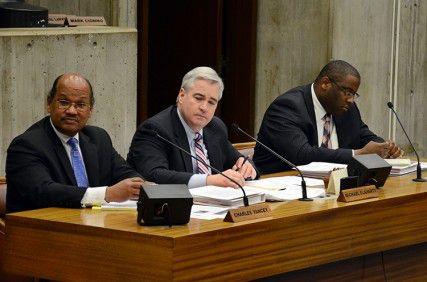
More than 300 Boston University officials and Boston residents attended a hearing at City Hall Wednesday to debate an ordinance that would ban BU from conducting research on deadly pathogens in its National Emerging Infectious Disease Laboratories.
City Councilor Charles Yancey’s proposed ordinance would prohibit research on Biosafety Level 4 agents in Boston, which look at dangerous and potentially fatal diseases and viruses. Proponents of the biolab point to the importance of Level 4 research and the safety measures in place that ensure the diseases would not be transmitted outside of the NEIDL.
“This vital research can be done safely and securely in Boston,” said BU’s Associate Provost for Research Gloria Waters. “Beyond making important scientific contributions, the NEIDL will also spring the local economy. The facility is expected to bring in $45 million in federal funding. It sends a clear message that Boston is open for business, scientific advancements and life-changing research.”
In the proposed ordinance, Yancey claims that deadly biological agents researched at the NEIDL could be released to the public accidentally or stolen and “weaponized.”
“My concern is that the research that will be taking place in this facility can cause very serious risks to the health and safety of the people of Boston,” Yancey said at the hearing.
City Councilor Tito Jackson echoed Yancey’s fears, and said he does not want to put first-responders at risk in the event of an accident at the NEIDL.
“It would be reckless and irresponsible to invite a Level 4 lab into the city of Boston,” he said. “The research would take place on pathogens for which we have no known cure. Just one human mistake can be catastrophic for the rest of society.”
Jackson urged City Councilors to do what they believed was best for the residents of Boston.
“This is not a question of whether or not we are for or against science,” he said. “This is a social justice question. This is a question of what should happen in the Roxbury community.”
BU Senior Vice President for External Affairs Stephen Burgay said banning study on Level 4 agents would harm Boston’s current reputation as a center of cutting-edge disease research.
“Prohibiting Level 4 research from happening sends a message to the Boston community that Boston is taking itself out of the business of really being quite aggressive in pioneering new cures and research,” he said. “People are going to start to look to take their research elsewhere, and the region will take an economic hit if we stop doing this research that can be conducted safely.”
Burgay emphasized the potential of further research at the NEIDL to find new treatments for infectious diseases.
“There are a number of diseases for which there are no cures today,” he said. “These diseases pop up every 12 to 18 months and any one of them has potential to turn into the next pandemic, and it is important to find ways to diagnose, treat and cure them.”
City Councilor Matt O’Malley said after touring the NEIDL, he was impressed with the safety precautions that were in place.
Despite touring the facilities, City Councilor Michelle Wu said she fears the NEIDL may be harmful to residents of surrounding areas.
“I worry about the density, as the biolab is located right in the center of the city,” she said.
Ronald Corley, chair of the microbiology department at the BU Medical Center, said many people have misconceptions about the NEIDL.
“The NEIDL is not going to produce biological weapons,” he said. “The NEIDL is not going to work with small pox — that is illegal.”
Corley said the NEIDL would benefit public health rather than hinder it.
“The NEIDL is a national resource for BU,” he said. “The mission is to use research findings to develop diagnostics, therapeutics and vaccines. This is public health.”




















































































































